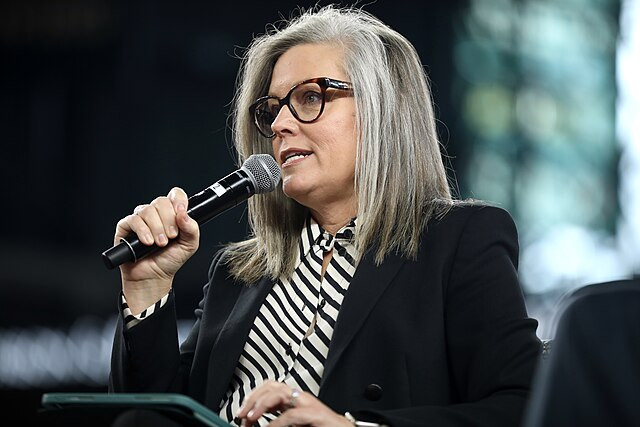Arizona Governor Katie Hobbs (D) has called out Republican lawmakers for their apparent hypocrisy following the state Supreme Court's decision to revive a 160-year-old, pre-statehood law that criminalizes abortion. The 4-2 ruling on Tuesday reinstated a near-total abortion ban with no exceptions for rape or incest, leaving Arizonans "reeling," according to Hobbs.
In an interview with CNN's Anderson Cooper, Hobbs criticized Republicans who are now saying the decision went too far, despite having previously celebrated the Dobbs decision that paved the way for the court's ruling. "The fact is that some of the Republicans right now who are saying that this decision went too far are the same politicians who celebrated the Dobbs decision, which paved the way for this court ruling today," Hobbs said.
She also pointed out that the speaker of the House and the Senate president had filed an amicus brief urging the court to make the decision it did on Tuesday. Hobbs renewed her call for the state legislature to repeal the "archaic ban" and protect access to reproductive care.
The ruling has sparked a surprising reversal among Arizona Republicans, who have historically championed abortion restrictions. State Representative Matt Gress, a Republican, said, "This decision cannot stand. I categorically reject rolling back the clock to a time when slavery was still legal and we could lock up women and doctors because of an abortion."
Republican State Senator TJ Shope called the decision "disappointing to say the least," while Kari Lake, a Republican running for the U.S. Senate and a loyalist of former President Donald Trump, said she opposed the ruling and called on the state legislature to "come up with an immediate commonsense solution that Arizonans can support."
The sudden shift in rhetoric from Republicans has been described as an "earthquake that has never been seen in Arizona politics" by Barrett Marson, a Republican consultant in the state. "This will shake the ground under every Republican candidate, even those in safe legislative or congressional seats," Marson said.
Some of the criticisms of the ruling have come from politicians who had previously supported the 1864 ban or cheered the end of Roe v. Wade. The apparent about-face has drawn criticism from abortion providers like Dr. Gabrielle Goodrick, who temporarily stopped performing abortions when Roe was overturned. "They are trying to play it both ways. They're trying to have this illusion that they're moderate to get votes, because they know that Arizonans do not want a total ban," Goodrick said.
The decision has also exposed a deepening rift between Republicans and their longtime allies in the anti-abortion movement. While Republicans raced to distance themselves from the long-dormant law, abortion opponents like Alliance Defending Freedom senior counsel Jake Warner celebrated the decision, saying it would "protect the lives of countless, innocent unborn children."
Arizona is one of roughly a dozen states where voters may be able to directly decide abortion rights in November. Activists have collected more than half a million signatures in favor of a ballot measure that would enshrine abortion rights into the state constitution. Democrats hope that turnout for this proposal will lead to a surge in support for their candidates, including President Joe Biden.
Vice President Kamala Harris, who is set to visit Arizona later this week, blamed the impending state ban on Trump, whose three Supreme Court appointees voted to eliminate the federally guaranteed right to an abortion. "Arizona just rolled back the clock to a time before women could vote - and, by his own admission, there's one person responsible: Donald Trump," Harris said in a campaign statement.





